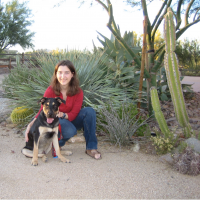
Meg Herriot, a Catholic veterinarian, explains why euthanasia is not compatible with human dignity.
There's a lot to say theologically about euthanasia in people and how it's morally wrong. I'm not going to argue those points here. The following is my view as a Catholic veterinarian who has also worked in human hospice care. Euthanasia comes up in my profession on a weekly, if not daily, basis.
One day when I was a new veterinarian, I had to euthanize 11 animals in one day. Many people think that because I euthanize animals and advocate humane euthanasia, that I'm pro-human euthanasia. This is assumed of me by my clients on a regular basis. Nothing could be further from the truth. First, every person has Human Dignity. Animals have a right to be free of suffering—they do not have Human Dignity.
St. John Paul II is an excellent example of redemptive suffering. Animals do not have redemptive suffering. In their suffering, their prayers do not lift up other people, and they are not united to Christ in the Crucifixion. Their suffering does not help repair relationships. Their suffering does not allow for their families to heal. These are "goods" that come from human suffering that does not come from animals who suffer. No one likes suffering and pain, and I'm not advocating some kind of masochism. I just want to lay out that there’s a huge difference between animals and people when it comes to end-of-life issues.
There needs to be improvement in access to hospice, and there have been marked advances in pain control in hospice—and we can continue to strive for more. In veterinary medicine, there are not "nursing homes" for pets, nor am I advocating for that. Most pet owners do not have the ability to provide hospice care for their pets due to the requirements for nursing care, skills, and time. Veterinary medicine, like any form of medicine, has financial costs. Most people are not able to afford end-of-life care that keeps their pet comfortable until natural death. Some people are able to, and in these circumstances, veterinarians do provide "hospice care" when able. There are some diseases where pets can die comfortably at home, but there are some diseases that only long-term intensive care and strong pain medication would have a possibility of helping—and to what end? Euthanasia in pets sometimes brings out grief that people don't have for other people. Human relationships with pets are typically not complicated. They are raw and composed of unconditional love.
What I've observed in human hospice is that human relationships are much more complicated. Time in nursing care and "time in dying" can be healing for relationships and families. The stages of dealing with terminal diseases are sometimes necessary to bring people together. This doesn't happen in veterinary medicine. People euthanize animals or ask for their animals to be euthanized for a variety of reasons. With some of the requests that have been provided to my colleagues and myself for terminating an animal's life, I really worry about the Pandora’s box and reasoning that could be opened up for ending a human's life. My colleagues and I have been presented with cases for euthanasia because "the pet no longer matches the carpeting" or "if you don't do it my husband will run over him with a car or drown him" or "they are inconvenient" or "I'm moving." I had one patient whose original owner died. The owner passed on her dog with a sum of money to take care of the dog. The nephew took the pet and, because the dog occasionally coughed, presented it for euthanasia because it "annoyed him." I was able to find a new home for the dog and pay for the cough suppressant he wasn't even willing to try. I was appalled that he would dishonor his aunt's memory and love of her dog.
There are some people who ask that their pets be euthanized when their owners die, and some veterinarians will do this. These pet owners feel that no one else will care for or love their pets like they do. Sometimes healthy young pets will be euthanized. There is not one standard in veterinary medicine of what's acceptable and what's not. There are veterinarians who will judge others on what they will and will not euthanize for. My test for myself is, "Can I go home and sleep at night with this on my conscience?” There are some situations that are messy in which I question my own judgement. Sometimes we are left with, "what option will cause the least harm to the animal and, if the person will not take responsibility for the animal, is it better to euthanize it than for it to suffer on the street?' These are all questions and circumstances that I hope human medicine will not have to ask.
Obviously, to me there is no question on this issue. Animals do not have redemptive suffering; we do. God has given us stewardship over all creation; hopefully we can respect the life that He has given us and only He has the right to take. I euthanize animals out of a respect for His creation. This is not without cost, though. My profession now has one of the highest rates of suicide and depression in any profession. This is due to a variety of factors, but I assure you, the euthanasia we provide and the complex decisions that go with it are a factor. I pray that human medicine recognizes the differences and the peril before it is too late. The next time someone says, "we euthanize our pets, so why don't we have the right to use this in human medicine," carefully consider what is missing from that analogy: Redemptive Suffering and a Pandora's box of issues.

Copyright 2018 Meg Herriot
Photo Credit: Canva
About the Author

Meg Herriot
Meg Herriot is a veterinarian and Third Order Dominican. She enjoys spending time with family, friends, and pets and blogging at All Creatures Great and Crazy about being a veterinarian, mother, wife and most of all a Catholic trying to grow closer to God in a chaotic world.


.png?width=1806&height=731&name=CatholicMom_hcfm_logo1_pos_871c_2728c%20(002).png)
Comments